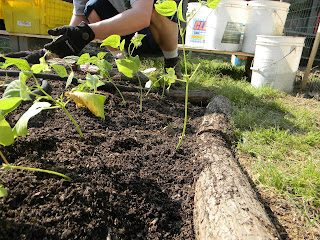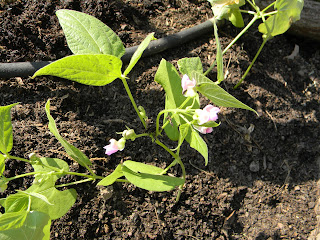If you are just now joining us for the Why I'm Not Babywise Series, Welcome! Please take some time to read the previous posts, especially my Intro/Disclaimer so you can read the rest of the posts in context. I am seeking to be very sensitive to my readers who may implement Babywise. I pray we can all show one another grace as we seek to parent all of our babies in the way God leads us. I invite considerate comments, whether you agree or disagree.
When I say that I'm "that mom" in Chapter One, except I'm not...what I mean is that Gary Ezzo sets up two hypothetical scenarios in chapter one. In one scenario we are introduced to baby Chelsea and her parents. They have decided to implement Babywise and because of that they have a happy thriving marriage and a practically perfect, content, happy, sleep-through-the-night-at-eight-weeks baby. In the other scenario we are introduced to Marisa and her parents, who have not implemented Babywise, but have instead adopted Gary Ezzo's skewed version of "attachment parenting". Marisa is fussy, unhappy, high-maintenance, and the list goes on, and her parents' marriage is falling apart. Throughout the book Gary Ezzo portrays attachment parenting as brainless, lacking common sense, almost animalistic, and extremely child-centered. Through his examples of Chelsea and Marisa he leads readers to believe that they can create by their efforts a "good baby" or a "bad baby".
He makes it look like there are only two parenting philosophies: Babywise, and his extremely exaggerated and skewed version of "attachment parenting", when in reality most parents adopt a style somewhere in between Babywise and AP that works for them and their family.
So Gary Ezzo would want you to believe that since I consider myself more AP than anything else, that I am "that mom" in Chapter One and Marisa is my baby. Except I am not that mom in chapter one and Marisa is not my baby.
In fact, I have yet to come across an attachment parenting family that looks anything like the family he describes in chapter one. Unfortunately many people that have no previous knowledge of attachment parenting will probably believe Gary Ezzo's version and assume that anyone that considers themselves an attachment parent or a non-Babywise parent looks exactly like his exaggerated and skewed fictional AP family. Let me just tell you, this is false! Get to know an AP mom and you will see that she is far from Marisa's mom. You will probably have more in common than you would even think.
(To read more about what attachment parenting actually is check out this website by Dr.Sears. He is the pediatrician that coined the phrase "attachment parenting" although parents have been practicing this style of parenting for hundreds of years. Also check out some common myths about what attachment parenting IS NOT. It is obvious Gary Ezzo does not have his facts straight when it comes to attachment parenting.)
Now on to Chapter One "Your Baby Needs a Family. " There is A LOT in this chapter I agree with. I come from a broken family (although I do not doubt my mother and father love me immensely) and I do know there is a lot of anxiety that a child feels when a marriage is not strong. I believe the Bible teaches, and even non-Bible believers understand, that a healthy marriage is vital to the health of the entire family. In the Bible, we are shown a beautiful picture of marriage in
Ephesians 5:22-33, where the husband is told to seek to love the wife as Christ loved the church and gave himself up for her. This is a sacrificial agape love that is beautiful and uplifting to the wife. In response to this love, a woman is told to submit to and respect her husband as the Church submits to Christ. (there is also an element of mutual submission but I won't get into picking apart this passage) I love the wisdom of the bible because psychologists secular and Christian agree that a woman's biggest need is love and a man's biggest need is respect. Okay, so back to my original point.
I agree that a healthy and Christ-centered marriage is of first importance.
On page 22 Ezzo states:
"Of all Chelsea's [the Babywise baby] emotional needs, her most basic is knowing mom and dad love each other. Every day, Chelsea observes her mom and dad relating to one another...To Chelsea, their commitment to one another is clear. It is not unanswered in her tiny heart."
Now let us remember this is a book about newborns and infants. A newborn can barely see eight inches away, so I am not sure how they are going to observe much of anything. Although as a baby gets much older they will definitely be able to observe their parents marriage and it will definitely affect their sense of emotional security,
I don't think a newborn is going to be doing much of this so-called "observing". A newborns most basic emotional needs are security and trust, knowing that her needs are going to be met.
Child-Centered Parenting
He then goes on to explain child-centered parenting, which he believes is what attachment parenting is. First of all, let us remember that newborn babies are helpless and have intense needs. When considering if one would like to have a baby, I hope every mother and father goes into it knowing that parenting is hard work and takes huge amounts of sacrifice and selflessness, especially in the first few months. It is a major adjustment and life does change. Life will never be the same, no matter how "good" your baby is.
Meeting your newborn baby's needs is not the same as centering the universe around them. There is no difference between wants and needs in the life of a newborn and they have no way to understand, in this stage of their development, "delayed gratification" and putting others first. You cannot spoil a baby by meeting their needs for food, love, and affection.
For a time, baby does come first, at least in practicality. This does not mean that mom and dad neglect the other's needs or the needs of the other children, but for a short while in the early months a baby's needs are the priority. Mom and dad can understand that this is just for a short time and can seek to grow in patience and in having a servant's heart. Older children can also seek to learn these very important godly attributes as they help tend to the needs of the baby. There will be give and take amongst all family members as they seek to best take care of this needy and precious little newborn. Remember, this is only a very short stage in the life of a child.
Meeting their needs in a loving way will not create a spoiled and demanding child, but rather a secure and well adjusted one.
Friendship and Conformity
Before I begin, let me remind you that
Gary Ezzo is estranged from his adult daughters and unfortunately does not have a friendship with them. He promises in this book and his others that if you follow his methods that your relationship will blossom into a beautiful friendship by the time your children are teenagers. He tells you to observe the "end results".
It is sad that his end results have not proven his proposed method.
I recently read a very
fair and balanced critique of Childwise, and apparently he deals more with the role of friendship and authority in that book. Let us remember Babywise is about parenting babies, who cannot even talk yet. Ezzo tells us on page 25:
"Back at Marisa's home, her mom and dad continue to strive for buddy status. They yearn for friendship, elevating Marisa to the level of peer."
I hope as my baby girl gets older than we can have a healthy relationship where she respects my authority but also feels comfortable sharing her heart with me. However, at this point in her development I probably wouldn't consider her a "friend" as Ezzo describes it, because we aren't even able to have conversations yet. Oh yes, we are buddies and she would probably consider me her favorite playmate, but I am unsure why Ezzo addresses friendship in a book about parenting a baby and infant. He says on page 26 about Chelsea and her parents:
"By the end of Chelsea's teen years, a beautiful friendship with her parents will begin to blossom. Indeed, this should be every parent's goal."
My oh my! I sure do hope that my friendship with my children will blossom before they are teens.
If it doesn't even begin to blossom until the time they are teens then we will have major problems. Instead of coming to my husband and I for advice about friends, dating, and peer pressure they will run to their friends. (I think Tripp does a great job of laying out a healthy balance of authority and loving communication, as well as practical applications, in his book Shepherding a Child's heart,
and you can read my review of it here.) I believe it possible to be respected as a godly authority by your children, and at the same time have a healthy and thriving friendship with them. I have seen many healthy examples of this among mothers of teens and older children, so I know it is possible.
Stay tuned for Part Two of this post in a few days.




































